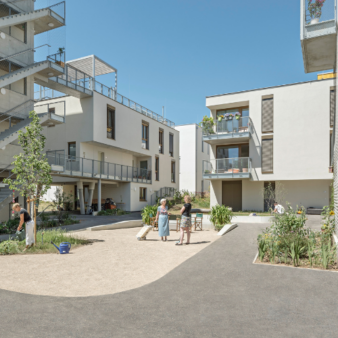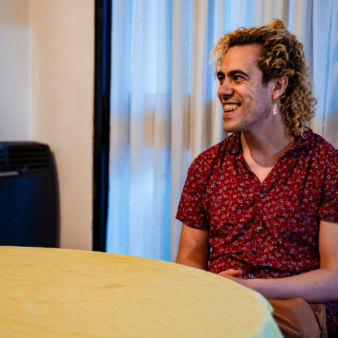Housing policy in Spain has historically favoured owner-occupancy, with just 15% of the country’s housing available for rent and just 2% of it designated for social rent. In Barcelona, property speculation and the proliferation of tourist flats have led to steep purchase and rental price rises in recent years. Increasing unemployment and decreasing wages have placed additional pressure on household finances, driving many people out of the city.
In the face of this affordability crisis, the ‘right to use’ housing cooperative model has begun to emerge as an alternative to traditional ownership and rent, encouraged by the success of initiatives overseas as well as by the favourable political landscape in Barcelona.
Sostre Cívic, meaning Civic Roof in Catalan, is a right to use housing cooperative founded in 2004 with the goal of providing a non-speculative alternative to people excluded from mainstream options. Unlike traditional ownership cooperatives, which have a long history in Spain, within the right to use model the cooperative retains ownership of the property and its members are granted the right to use the dwellings indefinitely. Sostre Cívic acts as an umbrella organisation and support entity that purchases and develops buildings for cooperative groups and advocates for the sector in Catalonia and throughout Spain.
Sostre Cívic aims to challenge the dominant culture that views housing as a financial investment and has a long-term ambition to diversify the tenure options in Catalonia’s housing market, so that in 20 to 30 years, 10% of the region’s homes are cooperatives.
The organisation currently has 1,000 members and 20 ongoing projects in Catalonia, comprising 99 inhabited homes and 257 under development.
The project in practice
The main purpose of Sostre Cívic is the dissemination of the right to use housing cooperative model and the provision of support for existing cooperative housing projects. The goal is that, as the number of cooperative housing projects increases, the cost of free market purchasing and rental pricing will be curbed.
Sostre Cívic is a democratic organisation with a Governing Council at its core. This council is made up of nine volunteers who are elected at an annual assembly and represent all the different types of members which includes residents, future residents, and working members.
The Governing Council is responsible for the organisation’s decision-making and for convening the other participation bodies, including:
- The Project Council, which supports projects in the development phase
- The Economy Table, which is responsible for preparing proposals around financing and budgets
- The Senior Citizen Roundtable, which brings together groups members working in the elderly housing projects
- The International Commission, which facilitates contact and synergies with cohousing projects around the world
In total, these bodies have around 100 members who are actively involved in the running of the organisation. There are also 18 paid professionals in Sostre Cívic’s technical team, who support all the tasks and actions necessary for the sustainability and management of the organisation. They include architects, social workers, administrative officers, economists, lawyers and journalists, among others.
Sostre Cívic acts as a non-profit developer. The organisation receives the support of local authorities regarding land availability and, where possible, buys existing properties, which generally involve lower costs in comparison to the construction of new developments.
For projects on public-owned land, the cooperative obtains a grant of use from the relevant public authority, on the condition that the residents must comply with the same criteria as they would if they were accessing social housing. However, in these projects, members also benefit from a public guarantee for their financing.
Sostre Cívic is considered a public utility association and is recognised by the administration as a social promoter, and therefore has the right of first refusal, as well as having pre-emptive rights. This means that before a property goes on the open market, it is offered to social sector organisations. In such cases, the Catalan Institute of Finance provides the funding for the acquisition of the building and its refurbishment, and grants Sostre Cívic use for 75 years. In these cases, residents must also comply with social housing criteria.
In areas where there are not many public options, Sostre Cívic will acquire private land. These projects are more expensive and the cooperative members must be able to afford the extra costs involved.
Sostre Cívic’s model is flexible and designed to accommodate a variety of circumstances and differing levels of opportunity. For example, sometimes a cooperative group is formed and finds a property that is suitable to their needs themselves, while at other times the organisation finds a suitable property for the model and then supports the formation of a group to inhabit that property. Each project is managed and funded independently of each other.
Residents are involved in all aspects of the planning, design and management of the project. They decide on all aspects related to the project, including approving the architectural design, the financing plan and viability report, and the cohabitation management and communication of the project. In some cases, members are supported by the professional team to participate in the simplest phases of construction.
Most of the services and suppliers that Sostre Cívic works with are non-profit entities with similar ethics and values, from architect and lawyer cooperatives to ethical banks. Construction is carried out by La Constructiva, the first non-profit cooperative oriented towards the construction of right to use cooperative homes. La Constructiva was established as a result of Sostre Cívic’s work, to address the issue of affordability and poor labour standards when working with traditional housing developers.
Sostre Cívic actively promotes the right to use cooperative housing model with awareness-raising campaigns and events and through continuous dialogue with public bodies and social entities to influence housing policy.
Funding
Sostre Cívic’s annual budget in 2020 was €535,079 ($570,689 USD). The organisation has two main funding channels: membership fees – €30 ($32 USD) per quarter or a reduced fee of €5 ($5.30 USD) for unemployed members and those under 30 years old – and public subsidies, which support work to promote the model.
Individual housing projects are financed through loans from ethical banking organisations and by the Catalan Institute of Finance. This public banking entity is part of the Catalan regional government, and has financed many projects under very advantageous conditions, especially when compared to those offered by the private sector.
In most cases residents are required to pay a deposit equivalent to 5 to 22% of the cost of the property when they move into their new homes, depending on how the land was adquired ant the construction or retrofit costs. This social capital is returned if they decide to leave the property and is replaced by the new occupants. Residents also pay monthly contributions, for the right to use the home indefinitely. Prices vary depending on the location and range from between €4.90 and €11.07 per m2 (or $5.22 and $11.80 USD per m2) including services. In the private rental sector for the same area, these prices range from between €6.47 and €11.07 per m2 (or $6.89 and $11.08 USD per m2), excluding services and usually for substantially lower quality units.
Projects on public land, where Sostre Cívic obtains a 75-year grant of land-use, also have access to state grants and subsidies through the State Plan for Access to Housing 2022-2025. Locally, the regional government of Catalonia provides subsidies from the Catalan Housing Agency.
Social and environmental impact
All residents are part of a democratic and participatory organisation and they are the key beneficiaries of the housing projects, gaining access to affordable and secure high-quality housing. The fact that the property can never pass into private ownership ensures future occupants can enjoy the same benefits.
Social inclusion is a key principle in housing cooperatives and all Sostre Cívic projects of 10 units or more must reserve between one to three units for disadvantaged groups, such as unaccompanied former migrant minors. The organisation works with them to seek financing to cover the initial deposit/social capital.
The organisation’s advocacy work is having significant impact, including a commitment by Barcelona City Council and its social housing entities to produce more than 1,000 new homes in the near future, of which at least 40% will be right to use cooperative housing.
Environmental sustainability is one of the fundamental pillars of Sostre Cívic’s model and the organisation has a checklist of architectural criteria that must be applied to all projects. This includes generating part of the electricity demand by means of solar panels and supplementing it by purchasing electricity from the cooperative renewable energy supplier Som Energia, producing domestic hot water with solar thermal panels, providing air conditioning via methods that exclude fossil fuels and reducing water consumption to 50% of that in a conventional building by recycling grey water for irrigation, toilets and washing machines.
All projects have the energy rating of A, according to the Catalan Institute for Energy, and must achieve, as far as is possible, the standard of near zero carbon emissions.
Transfer and expansion
The model was created with the aim of being replicable and Sostre Cívic works hard to promote right to use housing cooperatives in the public and political spheres alike.
The main challenge to the transfer and growth of the model, however, remains affordability. Persuading governments to support the implementation of right to use cooperative housing is key to lowering costs and Sostre Cívic works in alliance with other housing campaign groups to secure additional financing and resources.
Outside the region, Sostre Cívic networks with projects all over Spain and has contributed to the organisation of the first national meeting of right to use cooperative housing initiatives in Madrid. The second national meeting organised by Sostre Civic in November 2022 brought together more than 500 people in Barcelona.
Sostre Cívic’s commitment to transforming housing provision in Catalonia and beyond is clear. With each project, the organisation is providing an affordable, sustainable and ethical alternative to traditional ownership or rental models and challenging what it means to have a roof over one’s head.
One of the organisation’s current challenges is to “democratise” access to cooperative housing in Catalonia, in order to facilitate access to user profiles that do not have the possibility of dedicating many hours of voluntary work to the setting up of a housing project of these characteristics. This will be achieved by proposing systems of involvement with fewer requirements, assuming part of the initial effort with the cooperative’s technical resources and allowing the incorporation of members in phases of the project when it is already consolidated.

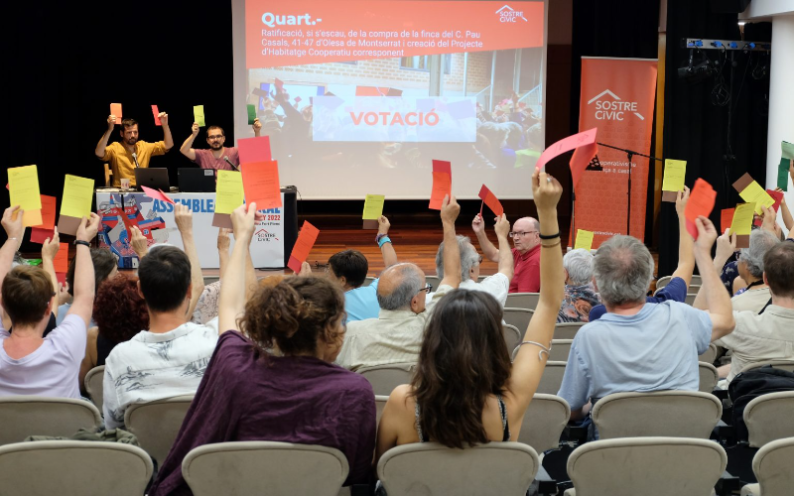
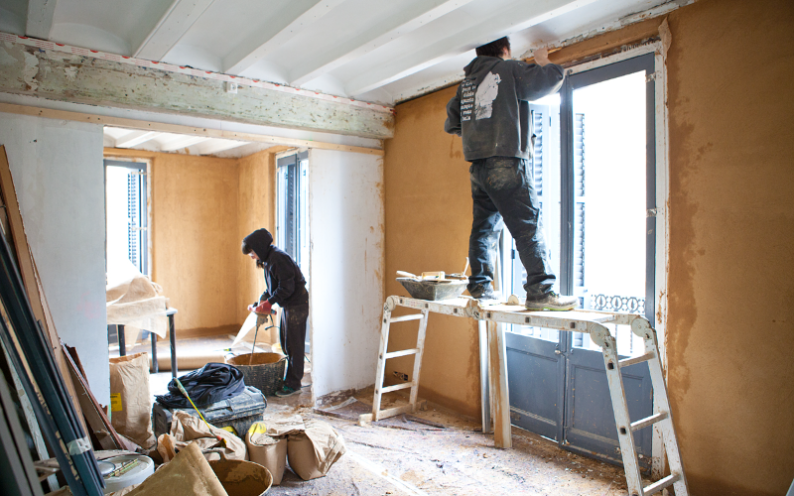
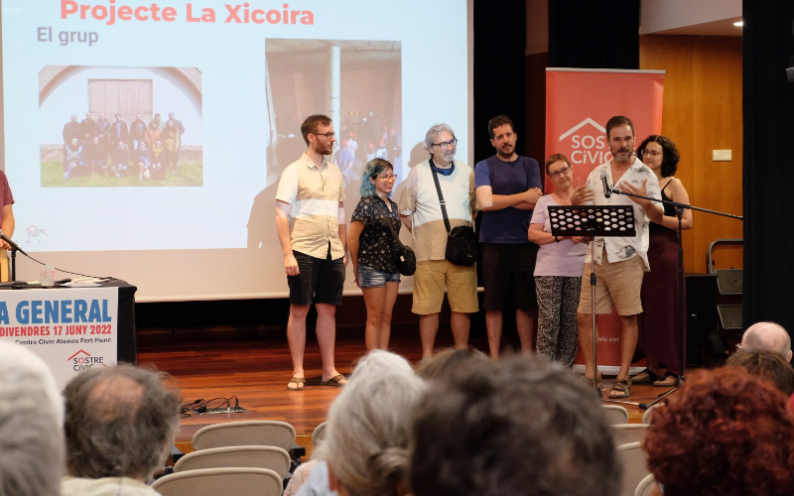
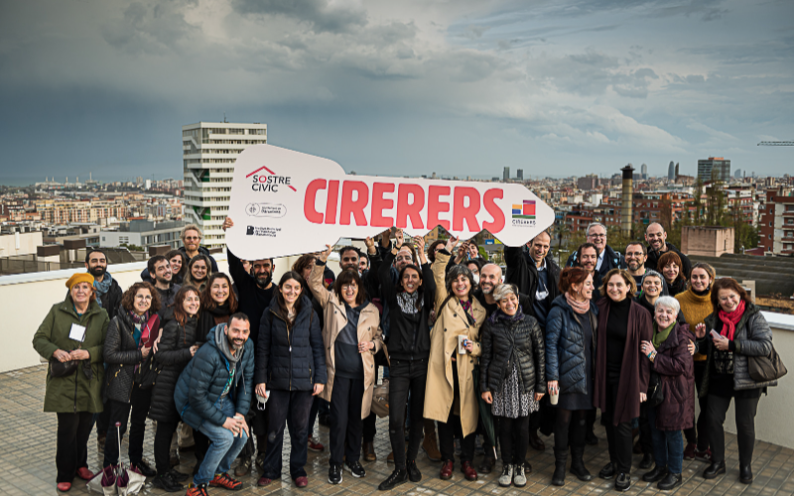
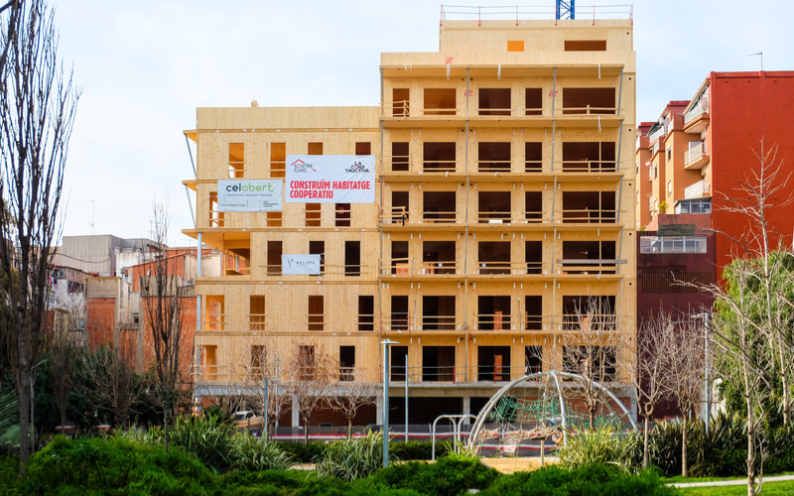
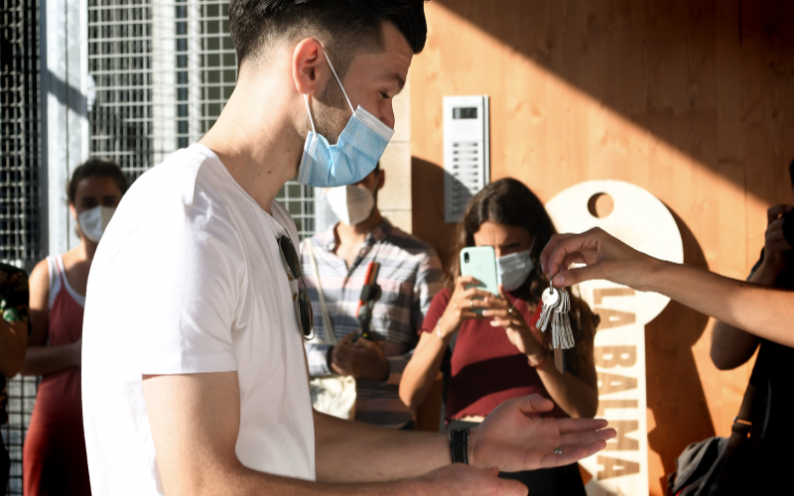
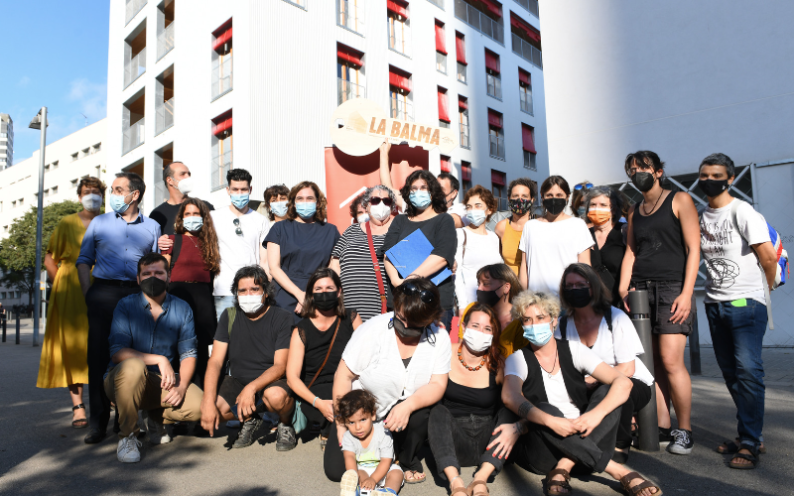


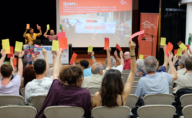
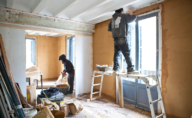
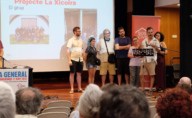
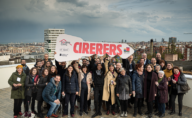
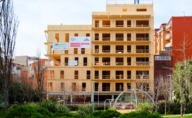
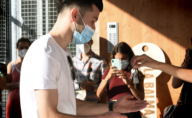
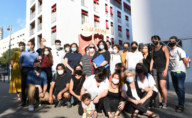
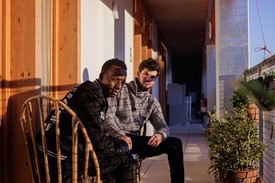 Abdel Sadiki and Nama Traore
Abdel Sadiki and Nama Traore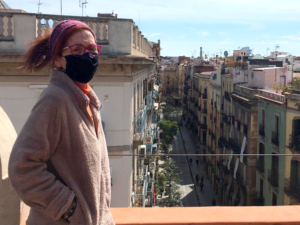 Maria Jesús is one of the first members of Sostre Cívic and is now a resident of Princesa 49, located in the Born neighborhood, in the heart of the gentrified center of Barcelona. This was the first Sostre Cívic project in 2018 and the first in the city of Barcelona with public collaboration.
Maria Jesús is one of the first members of Sostre Cívic and is now a resident of Princesa 49, located in the Born neighborhood, in the heart of the gentrified center of Barcelona. This was the first Sostre Cívic project in 2018 and the first in the city of Barcelona with public collaboration.